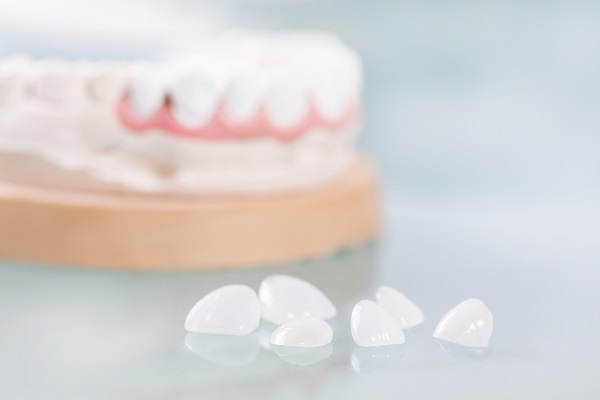Can Dental Veneers Cover Imperfections on Teeth?

Dental veneers are a great option to consider when looking to hide imperfections. When there are flaws or blemishes on the teeth, people are less apt to smile. However, with the help of dental veneers, it can feel better to smile! Ready to learn more? This article outlines how what veneers are and how they can be used for your teeth!
Why are dental veneers so popular?
According to the American Dental Association, dental veneers are thin, custom-made shells crafted of tooth-colored materials designed to cover the front side of teeth. They are said to be an option for correcting stained, chipped, decayed or crooked teeth. Because these shells are custom-made, patients can expect their dental veneer treatment to give them a great-looking smile.
Types of imperfections veneers can cover-up
Dental veneers can cover up many different types of imperfections on teeth. The list below shows some of the more common types of tooth imperfections that dental veneers can fix.
Tooth chips
Chips in teeth are not uncommon. They can occur when certain spots on a tooth experience constant wear and tear. Wear and tear tend to weaken the enamel until it eventually chips off the tooth. Chips can also happen when someone bites down on a piece of hard food or when involved in some type of accident that causes trauma to the mouth. When chips are located on the front teeth, dental veneers can be used to cover them up.
Tooth breaks
Any broken tooth needs to be repaired as soon as possible, as breaks can lead to tooth loss. Losing a tooth is the last thing anyone wants to happen, as a healthy mouth is one that has a full set of teeth. When someone breaks one of their teeth, it is often due to being involved in an accident that impacts the mouth, like auto and sports accidents. Teeth can also break due to a large cavity or losing a filling. Dental veneers are commonly chosen by patients who have broken teeth.
Tooth stains
Not all stains in teeth can be removed using a whitening product. Intrinsic stains tend to be difficult to remove and because whitening procedures only address the outside surface of a tooth, this type of stain tends to be permanent. When someone has an intrinsic stain on one or more of their front teeth, they will often hide their smile due to feeling self-conscience about the stains. Dental veneers can cover up intrinsic stains, which makes it a popular choice for those who have severely stained teeth.
Choosing veneers to fix flaws
Dental veneers can be used to fix all kinds of imperfections and flaws. They are safe and extremely natural-looking, which can help urge patients to show off their smiles. For questions or concerns about specific types of flaws and how dental veneers can be used to cover them, reach out to our office. Our team can help get you started!
Are you considering dental veneers in the Lakewood area? Get more information at https://www.leixdental.com.
Check out what others are saying about our services on Yelp: Read our Yelp reviews.
Recent Posts
Dental veneers can enhance your smile in a significant way. Research shows that even Hollywood stars get these restorations for a quick but lasting transformation. Discussing the right shade with your dentist will allow you to get the results you want. Here are the benefits of getting dental veneers that you must consider.These restorations are…
Clear aligners are becoming more and more popular as they offer advantages that traditional braces do not. Unlike braces, clear aligners are removable and cause less discomfort. However, they are a relatively new option, which means some people may still have some unfamiliarity with how things work. For example, clear aligners can be administered by…
A cosmetic dentist focuses on improving a person’s smile to boost their confidence and help them achieve their desired look. From crooked teeth to unsightly blemishes, many problems are fixable due to the hard work of cosmetic dentists. Here are a few of the ways in which a cosmetic dentist can revitalize the look of…
Are you considering cosmetic dental services to enhance your smile? Some people may think that cosmetic treatments are only about appearances. However, many cosmetic dental services are functional and cosmetic. Having straight teeth and an aligned bite can improve your smile in more than just appearance.Over the years, modern cosmetic dentistry has expanded to include…


